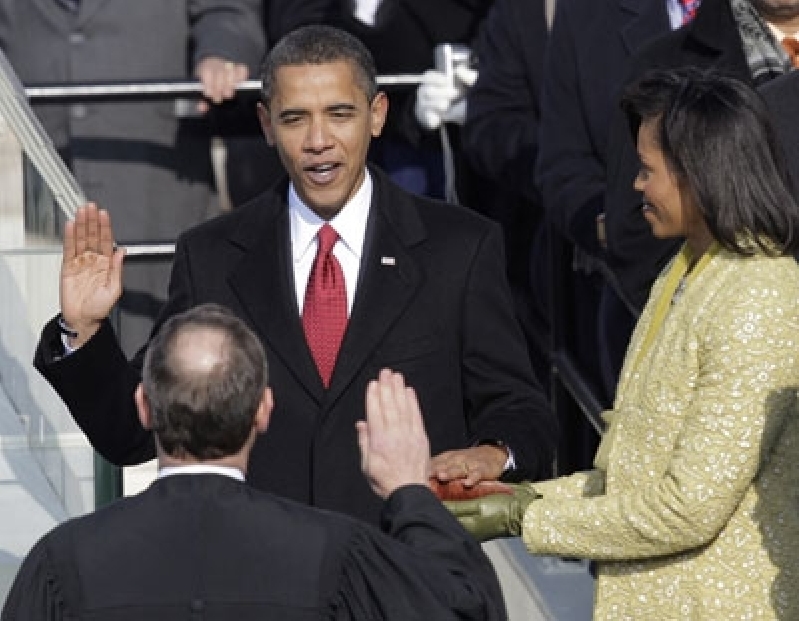
A federal appeals court on Friday upheld the dismissal of a lawsuit that challenged prayers and religious elements in presidential inaugurations, including President Obama's in 2009.
The claims made by atheists regarding the 2009 inaugural ceremony are moot, a three-judge panel of the U.S. Court of Appeals for the District of Columbia concluded, and the plaintiffs lack standing to challenge the 2013 and 2017 inaugurations.
The plaintiffs were led by atheist Michael Newdow who tried to keep the "so help me God" phrase along with the invocation and benediction prayers (led by Revs. Rick Warren and Joseph Lowery) out of Obama's inaugural ceremony.
Newdow, who lost similar challenges twice before, filed suit before the 2009 inauguration. A federal district court, however, rejected the complaint days before the ceremony, ruling that plaintiffs lacked standing. Newdow appealed.
They argued that the religious elements were violations of the First and Fifth Amendments, and in particular the Establishment Clause of the First Amendment.
References to "God' by Chief Justice John Roberts, Jr., and the invitation of ministers to pray "might have misled the uninformed to think the imprimatur of the state had been placed on the invocation of the Almighty and contributed to a social stigma against them as atheists," the atheists maintained.
D.C. Circuit Judge Janice Rogers Brown said Friday it was too late to act on Obama's inauguration.
"Whether the 2009 ceremony’s incorporation of the religious oath and prayers was constitutional may be an important question to plaintiffs, but it is not a live controversy that can avail itself of the judicial powers of the federal courts," Brown wrote in the opinion.
"It is therefore moot."
The judges also ruled against the atheists' attempt to block prayer and religious elements from being included in future presidential inauguration ceremonies.
It is really up to the President or the President-elect to choose what to include in an inaugural ceremony, and any other participants, such as the chief justice or clergymen, are "powerless" in that respect, Brown wrote.
Thus, issuing an injunction to prevent the defendants – including the Chief Justice Roberts, the Joint Congressional Committee on Inaugural Ceremonies and the Presidential Inaugural Committee – from implementing the future President's inaugural plan would be "folly," Brown noted.
The plaintiffs conceded that the President cannot be denied the prerogative of making a religious reference because doing so would abrogate his First Amendment rights.
"For sure, if it were otherwise, George Washington could not have begun the tradition by appending 'So help me God' to his own oath; Lincoln could not have offered a war-weary nation 'malice toward none' and 'charity for all [] with firmness in the right as God gives us to see the right'; Kennedy could not have told us 'that here on earth God’s work' must be our own," Brown wrote.
In a concurring opinion, Judge Brett Kavanaugh said the words "so help me God" in the presidential oath are not proselytizing or otherwise exploitative and use of the phrase is deeply rooted in the nation's history and tradition.
Prayers, Kavanaugh added, are also deeply rooted in American history and tradition and the ones said at the 2009 inauguration were also not proselytizing. Though the prayers contained a reference to Jesus, the Establishment Clause does not ban any and all sectarian references in prayers at public ceremonies, he wrote. Moreover, the sectarian references in the 2009 inaugural prayers were limited in number.
Though in agreement with the judgment, Kavanaugh wrote in his opinion that the plaintiffs did have standing to raise an Establishment Clause challenge to the religious elements in presidential inauguration ceremonies. But he rejected the plaintiffs' claims on the merits, concluding that the longstanding practices do not violate the Establishment Clause as it has been interpreted by the Supreme Court in previous cases.







